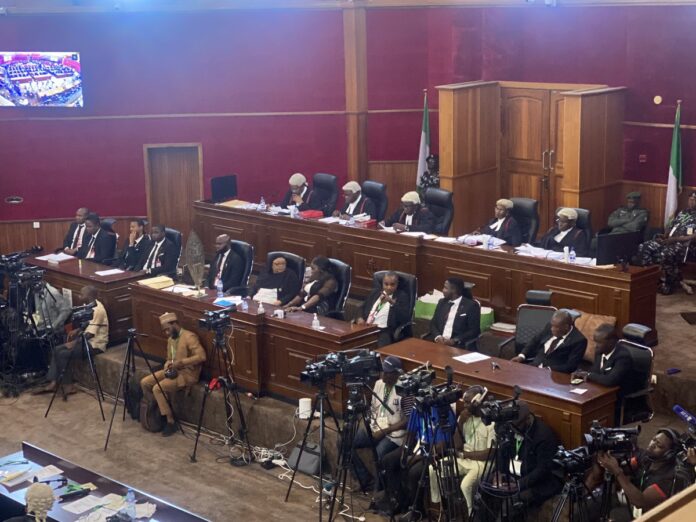A fierce debate has erupted in Nigeria following a campaign to strip the President of powers over the Independent National Electoral Commission (INEC) and judiciary appointments.
This bold initiative was launched last month by the Save Democracy Mega Alliance 2027 (SDMA’27), a coalition of pro-democracy groups and prominent leaders advocating for constitutional reform.
Their proposal aims to remove the President’s authority to appoint the INEC chairman and Chief Justice of Nigeria (CJN), alongside state governors’ powers over State Independent Electoral Commissions (SIECs) and state judiciary heads.
According to the coalition, these changes are necessary to shield Nigeria’s electoral and judicial systems from executive influence.
“He who pays the piper dictates the tune,” Tony Akeni Le Moin, SDMA’27 spokesperson, said during a recent press briefing in Abuja.
The coalition argues that transferring these powers to a non-partisan, integrity-vetted independent body would ensure transparency and fairness.
Prominent figures like Professor Pat Utomi have endorsed the movement, describing it as a historic step for Nigeria’s democracy.
“This is the most significant pro-democracy campaign since 1999,” Utomi said, referencing the Justice Uwais Electoral Reform report, which advocated similar reforms.
The coalition’s plan includes mobilizing public support, convening a national conference to propose amendments, and lobbying lawmakers to enact the changes.
SDMA’27 has warned that failure to adopt these reforms could result in another cycle of electoral manipulations in 2027, akin to the controversies surrounding the 2023 elections.
Quoting Rev. Martin Luther King Jr., the group called for organized resistance to what it described as a “national emergency” threatening Nigeria’s democracy.
However, the proposals have sparked mixed reactions from political and regional leaders.
Dr. Pogu Bitrus, president of the Middle Belt Forum, believes the issue extends beyond who appoints these officials.
“The real problem is not who appoints, but who fires,” Bitrus told DAILY POST.
He argued that without fear of dismissal, appointees could act independently, even if appointed by the President.
“The institution must be strong enough to hold everyone accountable, regardless of who appoints or fires,” he added, citing examples of stringent accountability measures in countries like China.
Bitrus suggested that draconian penalties for misconduct could serve as a deterrent, ensuring officials act with integrity.
Alhaji Yerima Shettima, president of the Arewa Youth Consultative Forum, expressed skepticism about establishing an independent body to oversee such appointments.
“How can you talk about independence when the system is already centralized?” Shettima questioned, highlighting the President’s overarching powers.
He also doubted the willingness of the current National Assembly to strip the President of these powers.
“This National Assembly is a rubber stamp. Nothing like this can happen under its watch,” Shettima stated.
Instead, Shettima advocated for strengthening institutions like INEC to operate independently, regardless of executive influence.
“Let us focus on reforms within INEC to make it robust and impervious to manipulation,” he suggested.
Similarly, Adebayo Fadipe, a Lagos State chieftain of the Peoples Democratic Party (PDP), welcomed the campaign, calling it essential to restore INEC’s integrity.
“The so-called ‘independence’ of INEC is a sham,” Fadipe said.
He criticized past INEC chairmen for being overly beholden to the Presidents who appointed them, with only a few exceptions.
“If the powers to appoint are removed from the President, it will pave the way for credible elections,” he argued.
Fadipe lamented that Nigeria’s elections have long been tainted by executive interference, undermining public trust in the system.
“Removing these powers will open a new chapter of electoral credibility in this country,” he asserted.

